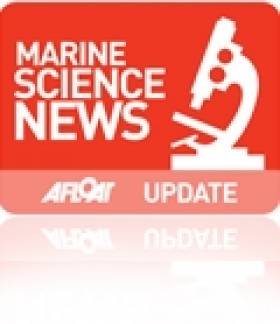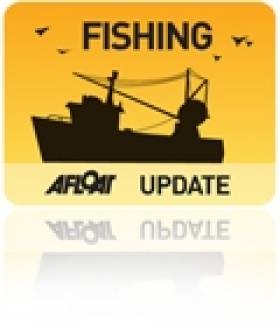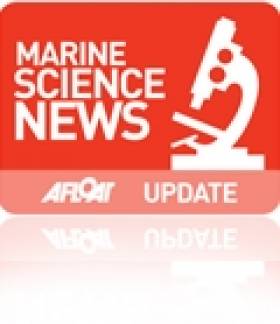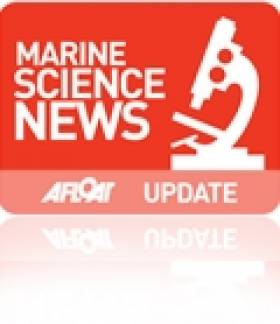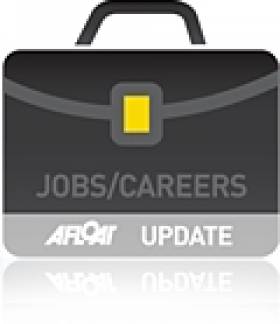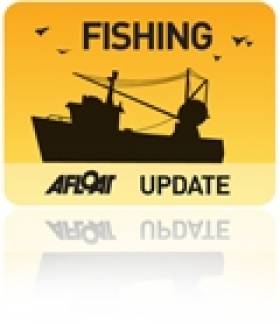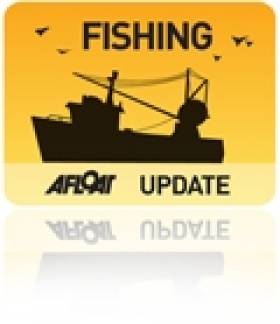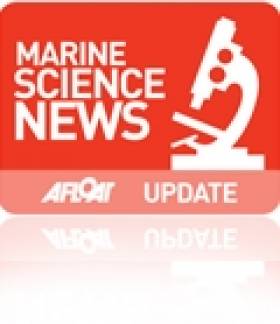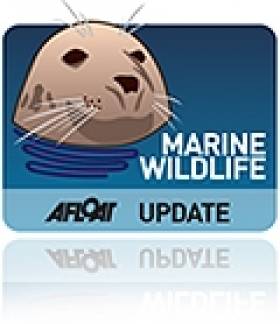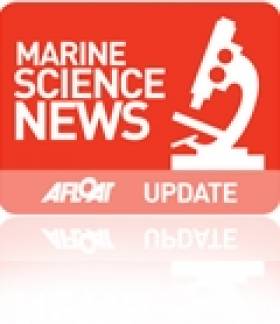Displaying items by tag: Marine Institute
Live Online Updates From Irish Weather Buoy Network
#MarineInstitute - Keep track on the status of Ireland's coastal waters thanks to the Marine Institute's website, which features live updates from the Irish Marine Weather Buoy Network.
The network is a joint project designed to improve weather forecasts and safety at sea around Ireland. The buoy network provides vital data for weather forecasts, shipping bulletins, gale and swell warnings as well as data for general public information and research.
Data recorded by the six buoys dotted around Ireland's coastal waters, both offshore and far offshore, includes stats on atmospheric pressure, wind speed and direction, wave height and even salinity levels.
The project is the result of successful collaboration between the Marine Institute, the Department of Transport, Met Éireann and the UK Met Office.
IFI Welcomes New Research On Sea Lice and Wild Salmon
#FishFarm - Inland Fisheries Ireland has welcomed "a clear acceptance of the impact of sea lice on juvenile salmon" following a recent Marine Institute publication that identifies the effect of sea lice emanating from aquaculture facilities on wild Atlantic salmon mortality.
According to IFI, the paper published in the Journal of Fish Diseases "concurs with previously published international research" that it says establishes an incontrovertible link between fish farm developments and negative effects on local wild salmon numbers, as previously reported on Afloat.ie.
It adds that "the debate can now progress to identify the best methodologies to reduce or eliminate this impact" as well as moves on "the issue of escaped farmed salmon".
In a statement on the new paper, IFI says the research "identified that just under 40% of released juvenile salmon showed a significant difference in return rate between sea lice ‘treated’ and ‘non-treated’ groups, indicating that mortality from sea lice is significant in 40% of the releases in the study. Unfortunately, there was a significant effect from sea lice in six different bays along the west coast over the study period.
"This recent study provides further evidence that salmon will be impacted by sea lice. The location of salmon farms in relation to salmon rivers and the control of sea lice prior to and during juveniles salmon migration to their high seas feeding ground is critical if wild salmon stocks are not to be impacted.
"The development of resistance to chemical treatment of sea lice and other fish husbandry problems, such as pancreas disease and amoebic gill disease, are likely to make effective sea lice control even more difficult in future years."
IFI also highlights the Norwegian government's concerns about the impact of sea lice and escaped farm salmon on wild salmon stocks.
The statutory body for the protection and conservation for Ireland's inland fisheries reiterated its support for "the development of a sustainable aquaculture industry" to "safeguard wild salmon and sea trout stocks into the future".
It adds that recommendations on the above issues have been made in its submission to the Department of the Marine on the Environmental Impact Statement regarding the proposed deep-sea organic salmon farm in Galway Bay, a scheme that has been the subject of controversy over recent months.
Irish Marine Science Research Boosted By Two Major Funding Awards
#marinescience – The Minister for Jobs, Enterprise and Innovation, Richard Bruton TD and the Minister for Research and Innovation, Sean Sherlock TD, today (Friday 25th January 2013) announced funding totalling €60 million dedicated to 85 pioneering research initiatives. These awards administered via Science Foundation Ireland's (SFI) Investigator Programme included two major awards supporting Irish marine science research.
Speaking of the announcement of the SFI Investigator Awards, Minister for Research and Innovation Sean Sherlock said, "over the past decade, Ireland has invested heavily in R&D and the rewards are clearly visible. What is particularly heartening about today's announcement is that much of this excellent research, which was selected competitively following international peer review is being done in collaboration with companies who are seeking to find new products and services, including IBM Ireland, Intel Ireland, HP, EMC and Bord Gáis."
On behalf of the Marine Institute, Dr Heffernan, CEO of the Marine Institute congratulated Dr Dagmar Stengel of the National University of Ireland, Galway and Dr Jens Carlsson of University College, Cork for their excellent performance in securing research funds from this highly competitive SFI scheme.
"The two marine based projects listed in the SFI Investigator awards are a recognition of the internationally ranked quality of these Irish marine research scientists and the relevance of their work to Irish industry. These projects are particularly relevant to those firms which seek to develop value-added products based on marine biological resources and are a boost for Ireland's marine research community," said Dr Heffernan.
Dr Heffernan also highlighted the significance of what these awards mean to Ireland's Integrated Marine Plan, Harnessing Our Ocean Wealth stating "each project will deliver new knowledge that supports the plan's goals for a thriving maritime economy and healthy ecosystems."
Both researchers had previously been funded by the Marine Institute. Dr Jens Carlsson worked within the Fish Population Genetics project supported by the Beaufort Marine Science Awards. A project led by Dr Stengel, Phlorotannins in Irish Brown Seaweed - Investigations of their UV protective - Effects and Potential as Natural Sunscreens was funded under the NDP awards 2000-2006. Dr Stengel is currently a Principal Investigator on the MI/DAFM co-funded NutraMara marine functional foods project.
The SFI award to Dr Carlsson of €194,498 will support the project, Taxonomy and connectivity of animal species at the Moytirra hydrothermal vent field: developing methods for assessing ecological impacts of mineral extraction in the deep-sea. This award builds on the expedition held on the RV Celtic Explorer, which was funded by the Marine Institute and lead by University College, Cork that discovered the Moytirra hydrothermal vent field in July 2011.
Dr Stengel received an award of €244,782 to support her project, Iodine in commercially valuable Irish seaweeds: variability, pathways, and implications for industrial applications.
Marine Institute Invites Applications for Summer Work Placements
#MarineScience - The Marine Institute is inviting students to apply for a number of work experience placements in many exciting areas for this summer 2013.
The list and short description of the positions (available in a Word doc HERE) include 26 placements for 15 work titles.
The bursaries are worth €2,200 each for an eight-week placement based in various locations including the Marine Institute in Oranmore, Co Galway; Newport, Co Mayo; Harcourt Street in Dublin; and ports around the country.
The Marine Institute’s Bursary Programme provides valuable practical experience for budding marine scientists in areas of research such as marine fisheries, salmon management, aquaculture, environment, communications and the library.
The Bursary Programme is aimed at undergraduates of universities, institutes of technology and national institutes for higher education. The scheme is strictly limited to undergraduates who have completed two years' study in a relevant discipline.
Previous bursars have gone on to work in the Marine Institute (including two directors of the institute), Bord Iascaigh Mhara (BIM), regional fisheries boards, county councils, pharmaceutical companies and State laboratories, with some going as far afield as the EPA in Sydney, Australia and some now running their own companies.
To apply for the Summer Bursary Programme:
- Please check out the 15 bursary titles on offer (via the link above)
- Select the two bursaries that interest you most and in order of preference
- Complete the Marine Institute Bursary Application Form 2013 and return it FAO Annette Jordan, Marine Institute, Furnace, Newport, Co Mayo
The deadline for receipt of applications is 8 February 2013.
Opportunity For a Director With The Marine Institute
#Jobs - The Marine Institute is seeking applicants for the position of Director of Marine Environment & Food Safety Services.
The director will lead an experienced team responsible for the delivery of a number of critical functions in support of seafood safety, fish health and the protection of the marine environment.
The successful candidate will work closely with Government departments, external parties and key stakeholders in the effective management of scientific services and provision of policy advice.
The director will also provide strategic direction in the targeting and management of competitive research projects funded nationally and internationally.
Candidates will have successfully managed programmes, people and resources at a senior and strategic level. You will be able to demonstrate relevant experience and qualifications as detailed in the job specification to include a primary degree complemented by at least seven years post-qualification work experience.
A detailed job description can be found at the Marine Institute website HERE. The closing date for receipt of applications is 5.30pm on Tuesday 5 February 2013.
The Marine Institute is an equal opportunities employer.
Sustainability of Fish Stocks Improving Says Minister
#Fishing - Dr Peter Heffernan, CEO of the Marine Institute, presented the Minister for the Marine Simon Coveney with The 2012 Stock Book ahead of the EU Fisheries Council negotiations next week, noting an improvement in certain fish stocks with a higher number of stocks sustainably fished in 2012 compared with 2011 - as Tom McSweeney writes about in his column last Friday.
The Stock Book gives an overview of 59 stocks from which Ireland has an EU quota allocation and will be used to inform discussions and decisions on Total Allowable Catches (TACs) fishing quotas for 2013. TACs and quotas will be decided at the December EU Fisheries Council on 18-20 December which will be attended by the minister, who has lately faced criticism over the proposed deep-sea salmon farm in Galway Bay.
Minister Coveney said: "I welcome the comprehensive review carried out by the Marine Institute showing the state of fish stocks that are of importance to Ireland. Of the 59 stocks in which Ireland has a share of the EU TAC, 42% are now fished sustainably compared to 36% in 2011. The state of the resource base in terms of the biomass, the population of mature fish in the stock, has also improved. The number of depleted stocks has declined from 12 to 8.
"It is good to see progress on delivering sustainable fishing. Further efforts are needed both in terms of setting TAC levels and also taking other measures such as reducing catches of juvenile fish and dealing with unacceptable levels of discards.
He added: "Having the latest scientific information at my fingertips is essential at the December council. My approach to the negotiations will be to utilise this science to ensure EU fishing policy secures the long term sustainability of the industry.
"The December Council negotiations must concentrate on achieving a more practical and pragmatic regime for the fishing industry, grounded in the scientific data available in the Stock Book.”
The Stock Book advice is developed using the latest available research, assessments and advice on the fisheries resource. Irish scientists collaborate with other international scientists at the International Council for the Exploration of the Seas (ICES).
“ICES is a key forum for Ireland where our scientists develop impartial scientific advice that meets best international standards,” said Dr Heffernan.
The Stock Book is presented annually to Department of Agriculture, Food and the Marine. The information is of vital importance in serving Ireland during the annual TAC negotiations at the various EU Council of Fisheries meetings, but principally at the December council meeting where the quotas for the following year are set.
It is also of interest to a wider audience, including the fishing industry, marine scientists, managers, environmental NGOs, third level institutes, financial institutions and those with an interest in the status and management of marine fisheries resources in the waters around Ireland.
The Stock Book has been published by the Marine Institute since 1993 and has evolved considerably in that time period. It continues to evolve in a changing fisheries advisory environment. The Stock Book is available electronically on the Marine Institute’s website HERE.
Unfishable Areas May Be Refuge for Endangered Flapper Skate
#FISHING - Marine scientists working in the Celtic Sea have discovered a natural refuge for the critically endangered flapper skate.
Many elasmobranchs (sharks, rays and skates) are highly vulnerable to over-fishing, but a new paper in the open access journal PLOS ONE shows that small areas of the seabed that experience below-average fishing intensity can sustain greater populations of these species.
The study reveals that one remarkable area in the northeastern Celtic Sea - where uneven seabed makes trawling difficult - supports at least ten species of elasmobranch, including the rare blue skate (Dipturus flossada) and related flapper skate (Dipturus intermedia).
Dipturus was previously considered to represent a single species (D. batis), but made the news in 2009 when a case of misidentification was revealed.
Both species are now listed as critically endangered but populations of the flapper skate, which can grow up to 2.5 metres in length, are considered to be under greatest threat from extinction.
European Union regulations mandate that fishermen throw back any flapper skate but its slow growth and reproduction mean that even very low levels of fishing mortality are now unsustainable for this species.
Scientists from Queen’s University Belfast, Bangor University and the Marine Institute carried out the study. Lead researcher Dr Samuel Shephard suggests that “the discovery of a Celtic Sea stronghold for flapper skate provides a remarkable opportunity to help save a species on the verge of extinction”.
Professor Michel Kaiser, chair in marine conservation at Bangor University, added: “Some have previously argued that areas of little interest to the fishing industry are not worthy of conservation, however this study clearly overturns that perception and highlights just how important some of these areas are."
Importantly, the fishing industry has reacted positively to the ‘win-win’ situation that an area of little commercial interest has potential as an important marine reserve.
Professor Dave Reid of the Marine Institute presented the information to industry leaders, and this has led to the inclusion of the area in proposed management plans for elasmobranchs in the Irish and Celtic Seas.
Eibhlín O’Sullivan, CEO of the Irish South & West Fishermen’s Organisation, responded that the Irish fishing industry "has been working with the Marine Institute for the past 18 months on developing a management plan for skates and rays. This new research adds valuable information for the identification of potential seasonally closed areas."
Prof Reid noted that “this is a great model for collaboration on conservation between the fishing industry and scientists”.
The research leading to these results has received funding from the European Community's Seventh Framework Programme (FP7/2007-2013).
Irish Marine Science Chief Appointed to European Research Board
#marinescience – Dr. Peter Heffernan, CEO Marine Institute, has been appointed to the European Research and Innovation Area Board (ERIAB) by European Commissioner for Research, Innovation and Science Máire Geoghegan-Quinn. The 11 member board advises the Commissioner on issues relating to the development of the European Research Area, including the €80 billion Horizon 2020 Programme for Research and Innovation (2014-2020). Members of the ERIAB are appointed for a four year term and the mandate of current ERIAB extends to February 2016.
"I look forward to working with Dr. Peter Heffernan as a member of the European Research and Innovation Area Board, ERIAB," said Commissioner Geoghegan-Quinn. "In the coming years, ERIAB will play a vital role in the development and optimisation of the European Research Area. Members of ERIAB are highly respected scientific and policy advisors who will draw on their extensive experience at national and international level, and I am delighted to have an Irish member of Peter's calibre on board".
The Taoiseach Mr Enda Kenny, TD said the appointment represented an important recognition not only of Dr Heffernan's own contribution but also of the work of the Marine Institute over the years. "Ireland and Europe share many objectives in supporting sustainable ocean economic activities as an important engine of growth in our recovery. I have no doubt that Peter's contribution to ERIAB will be very beneficial in this regard".
Welcoming the announcement, Minister for Jobs, Enterprise and Innovation, Mr Richard Bruton, TD, congratulated Dr Heffernan on his appointment which he said not only reflected Dr Heffernan's standing in the European research community, but also that of Irish science, technology and innovation.
Minister for Agriculture, Food and the Marine, Mr Simon Coveney, TD, joined in congratulating Dr Heffernan, and noted that this appointment also acknowledged the importance of marine science, technology and innovation for the European Research Area, a topic Dr Heffernan has championed both in Ireland and in Europe.
The ERIAB plays a key role in developing, promoting and evaluating EU research, development and innovation policy initiatives and actions, including the further development of the European Research Area (ERA), the implementation of the proposed €80 billion Horizon 2020 Programme (2014-2020) and the Europe 2020 and Innovation Union Strategies. Europe 2020 is a 10-year strategy aimed at reviving the economy of the European Union through "smart, sustainable, inclusive growth, with high levels of employment and living standards".
In July 2012, the Irish Government, through the interdepartmental Marine Co-ordination Group, launched Harnessing Our Ocean Wealth – An Integrated Marine Plan for Ireland, setting out a roadmap to harness the potential of Ireland's marine resource. This plan, part of the marine sectors contribution to the Europe 2020 Strategy, will contribute to the development of the Action Plan of the European Union Strategy for the Atlantic (EUSA) which will have a major bearing and influence on the topics to be supported by EU Structural, Regional, Research and Environment Funds between 2014 and 2020.
Porbeagle Sharks Tagged & Tracked Online by Marine Institute
#shark – October 2012 marks an important milestone for the Marine Institute and Irish Elasmobranch Group's porbeagle shark tagging project as five more porbeagles have been tagged off the Donegal coast by the project's expert shark angler, Peter McAuley. The project, which has been ongoing since 2008, is now offering the public an opportunity to track the movements of two sharks in near real time on the Irish Elasmobranch Group's website, www.irishelasmobranchgroup.org.
Five sharks were tagged with conventional pop-up satellite tags, which will record the sharks' location and depth, over a nine month period. After this, the tags are programmed to detach, float to the surface and transmit the data to orbiting satellites. In addition to the pop-up tags, two of the tagged sharks were fitted with Smart Position or Temperature Transmitting (SPOT) tags. These tags are fitted on to the dorsal fin of the sharks and each time the fin breaks the water's surface, a position is transmitted to an orbiting satellite. This allows the sharks to be tracked in near real time and it is believed that this is the first time these tags have ever been fitted on porbeagles. The tags should function for at least the next year, providing a completely new insight into the behaviour of these sharks.
Porbeagle sharks, which are a very timid species of shark, can grow to over three metres and 250 kilograms, and are one of the largest predatory sharks in Irish waters, feeding on fish. Once the target of intensive commercial fishing, the porbeagle shark is now considered to be critically endangered in the northeast Atlantic by the International Union for Conservation of Nature (IUCN). Since 2010, fishing for porbeagles has been banned in European waters; however, as little is known about its biology or ecology, such effective conservation measures are difficult to implement. The research team, comprising Dr. Ryan Saunders, Dr. Maurice Clarke and Dr. Edward Farrell, are attempting to understand the biology and ecology of the porbeagle shark by using advanced satellite linked tagging techniques. The project has already yielded some very important results, the most notable of which was the tagging of one shark, a juvenile male, that migrated over 2400 km from Ireland to Madeira. The movement of porbeagles from European waters to African waters was previously unknown and it has important implications for the conservation and management of the species.
In 2011 the research team was successful in attaining funding from both the Swiss based Save Our Seas Foundation and the German based Naturschutzbund Deutschland (NABU) to continue the project and to build on the important findings already made. Given the large scale movements of porbeagles, collaborations were also developed with the Centre for Environment, Fisheries and Aquaculture Science (CEFAS) in the UK and with the French Research Institute for Exploitation of the Sea (IFREMER).
These five newly tagged sharks also need names so a competition is being organised in collaboration with Galway Atlantaquaria which will give school children the chance to name these five sharks. Details about the competition are available on the Irish Elasmobranch Group website.
#marineinstitute – The Commissioner for Research Science and Innovation visited the Marine Institute in Galway Friday 28th September 2012, together with Robert-Jan Smits, Director General, DG Research Science and Innovation. They participated in a round table discussion with Government officials and research and innovation organisations. The discussions centred around two Irish reports, Harnessing Our Ocean Wealth – An Integrated Marine Plan for Ireland (July 2012) and the Report of the Research Prioritisation Steering Group (March 2012), and their anticipated synergies with the European Blue Growth Strategy, Horizon 2020 and the EU Atlantic Strategy.
The participants included Tom Moran, Secretary General, Department of Agriculture Food and the Marine; Frank O'Mara, Director of Research, Teagasc; Aidan Hodson, Department of Enterprise, Jobs and Innovation; Mark Ferguson, Director General, Science Foundation Ireland; Dermot Clohessy, Industrial Development Authority; Julie Sinnamon, Executive Director, Enterprise Ireland; Tom Boland, CEO, Higher Education Authority; Declan Meally, Sustainable Energy Ireland; and Peter Heffernan, CEO Marine Institute.




























